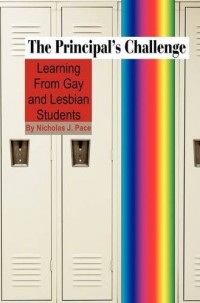 There’s no question that Nicholas Pace means well. In The Principal’s Challenge, he chose to write about his experiences as a high school principal so that he and his peers could better understand gay teens and help them make it through to graduation ― an admirable goal.
There’s no question that Nicholas Pace means well. In The Principal’s Challenge, he chose to write about his experiences as a high school principal so that he and his peers could better understand gay teens and help them make it through to graduation ― an admirable goal.
Unfortunately, it’s difficult to imagine a large audience for this book. Pace writes for educators, yes, but seemingly for those who don’t already know any gay people. That’s a pretty small corner of 2011 America. Perhaps a pamphlet or presentation would have made more sense than a book-length work. There is also an issue of privilege and power; the first section describes Pace’s awakening to the issues facing gay teens, and this is difficult to relate to. This straight male administrator with the privilege to be unaware of gay teens’ obstacles, or really of gay people at all, has a forum to tell us all about it. I’m happy that Pace came to realize that this issue is important, but I don’t particularly want to read about his journey.
It doesn’t help that The Principal’s Challenge is poorly written and edited. The middle section consists of bios of eight teens who won a college scholarship named after Matthew Shepard. Pace records their stories as lengthy, bland descriptions of the students’ adolescences, whereas anecdotes in the kids’ own words would have made for a much more interesting read. A more skillful writer and a more diligent editor would have ensured that I didn’t have to read passages such as, “After he gradually came out and was known in school as being gay, a number of others followed suit, perhaps as many as six or eight students. Both Mark’s status as the first, as well as that a handful of students followed suit, reasonably soon after seem remarkable.â€
The final section, and the strongest in the book, is a call to action. Here Pace asks his fellow educators to see gay kids as people, not problems, and to understand that a school in which queer teens can’t achieve is, well, a school where teens can’t achieve.
Yes, Pace’s heart is in the right place … but you know what they say about good intentions.
Reviewed by, Daisy Porter
San José Public Library
